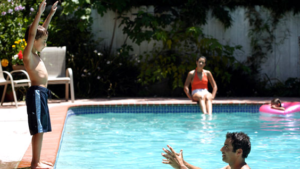
It’s always best to supervise children in the pool or have them swim with a buddy.
“Last one in is a rotten egg!”
Do kids still say this? Remember the unbridled enthusiasm kids exhibit whenever it is hot and a swimming pool, pond or lake is in reach. Jump in – think later. That’s what kids do.
But responsible parents, guardians, friends and neighbors recognize that if childhood enthusiasm is allowed to go unchecked, bad things can happen. These bad things can include diving injuries, slips and falls on pool decks, suction entrapment in pool drains, electrical shocks, near-drownings and drownings.
According to statistics from the U.S. Centers for Disease Control and Prevention (CDC), children ages 1 to 4 have the highest drowning rates. Drowning is responsible for more deaths of children ages 1-4 than any other accidental cause of death, and most drownings occur in home swimming pools. Males comprise 80 percent of those who die from drowning, and drowning is second only to motor vehicle accidents as the leading cause of accidental death among children ages 1-14.
Because youth plays such a role in drowning frequency, parents must face the difficult question: “When is my child old enough to be allowed to swim without adult supervision?”
The answer depends on many factors. How strong a swimmer is your child? How emotionally and intellectually mature? How much of a “dare-devil” is he or she? For example, is your child likely to try dangerous stunts to show off to friends? Will there be a “buddy” available to summon a responsible adult, if needed?
Professionally managed local municipal and club pools where lifeguards are on duty have varying rules on this point. Some allow children as young as 8 years old to be left unattended; others don’t allow children to be dropped off alone until they are at least 13 years old.
When you are deciding whether your child is old enough to be left unattended in your backyard pool, please remember that there likely will be no lifeguard in your absence. Adjust the minimum responsible ages upward accordingly. As the parent or guardian, you must evaluate the right time to trust your child to behave responsibly enough to be left alone at a swimming pool.
Even the best and strongest swimmers can get into trouble from time to time. Accidents can happen even when you are careful. For that reason, it is a good idea that no one – children and adults alike, but especially children and the elderly – ever be allowed to swim without a buddy or observer to watch over them when swimming.
For other safe-swimming tips, please see our blog, Everybody in the pool, safely!
This loss control information is advisory only. The author assumes no responsibility for management or control of loss control activities. Not all exposures are identified in this article.
